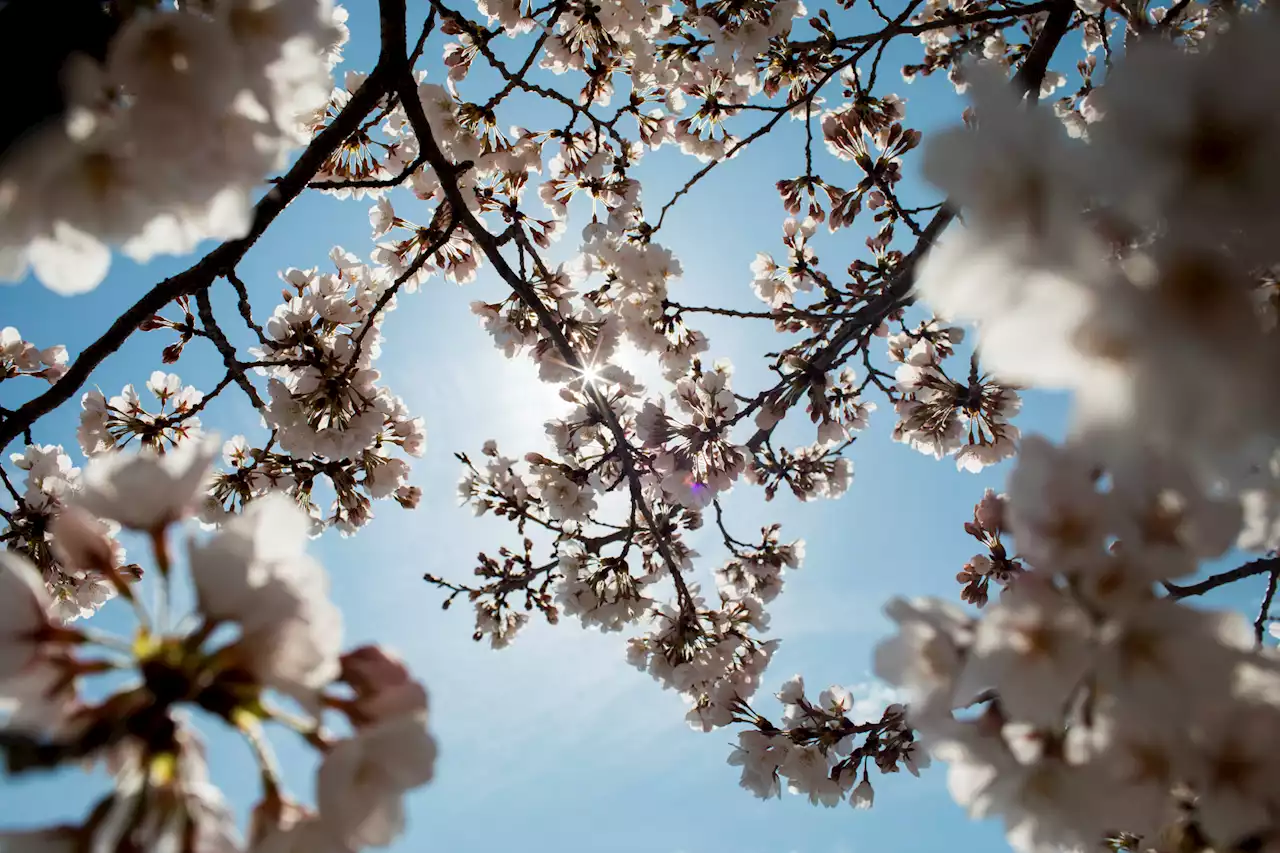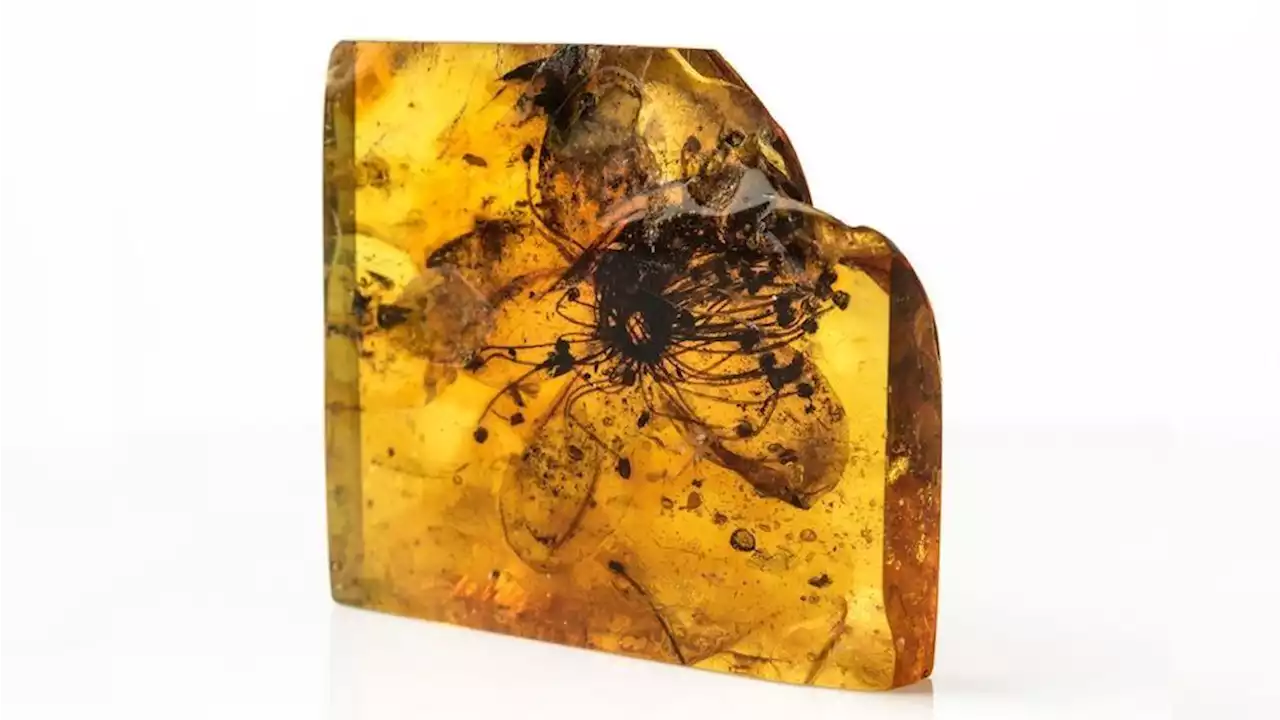The fossilized flower is the largest ever discovered.
Scientists have officially identified the largest fossilized flower ever recorded: a nearly 40 million-year-old flower entombed in a hunk of amber, according to a study published Jan. 12 in the journal Scientific Reports . The flower had been known for 150 years but has only now been definitively identified as a new species and is offering new clues to climates and ecosystems of the past.
Measuring about 1 inch wide, the strikingly well-preserved flower is three times larger than the next-biggest amber-embedded bloom ever found and was unearthed in 1872 in the Baltic forests of northern Europe. It dates to the late Eocene epoch . When the specimen was first discovered, naturalists classified it as the now extinct Stewartia kowalewskii, an ancient flowering evergreen plant, according to a statement .
The flower was then housed in the Natural History Museum in Berlin for the next century and a half. However, for years, researchers questioned the blossom's true identity.To lay to rest the uncertainty surrounding the blossom's genus and species, researchers extracted specks of pollen and examined them, along with the bloom's anatomy, under a microscope. They determined that the flower wasn't S. kowalewskii — or even from the genus Stewartia.
While they're harder to come by, plants in amber provide paleobotanists with a wealth of information, Eva-Maria Sadowski , a postdoctoral researcher at the Natural History Museum in Berlin, told The New York Times. The reclassification of this flower is important because it provides scientists with a better understanding of the ecological diversity of the Baltic amber forest and how the planet's climate has changed over time.
"These tiny grains are natural recorders of past climates and ecosystems that can help us measure how much our planet has changed in the past due to natural causes," Regan Dunn, a paleobotanist and assistant curator at La Brea Tar Pits and Museum in California who was not involved with the research, told The New York Times."This allows us to better understand just how much our species is impacting the planet.
Canada Latest News, Canada Headlines
Similar News:You can also read news stories similar to this one that we have collected from other news sources.
 Miley Cyrus’ ‘Flowers’ Set to Bloom on U.K. ChartRaye’s “Escapism” has the early edge on Cyrus’ “Flowers”.
Miley Cyrus’ ‘Flowers’ Set to Bloom on U.K. ChartRaye’s “Escapism” has the early edge on Cyrus’ “Flowers”.
Read more »
 Could One Of The Warmest Januarys On Record Affect The Cherry Blossoms' Peak Bloom Date?While it's too soon to predict peak bloom for Washington's famous cherry blossoms, other plants are emerging early due to warmer temperatures.
Could One Of The Warmest Januarys On Record Affect The Cherry Blossoms' Peak Bloom Date?While it's too soon to predict peak bloom for Washington's famous cherry blossoms, other plants are emerging early due to warmer temperatures.
Read more »
 Missing woman's body, car found in Oregon river over a month after disappearance: policeInvestigators believe they have recovered the body of LaDawn Rene Bloom from a submerged car that was pulled from a river in Seaside, Oregon, on Saturday afternoon.
Missing woman's body, car found in Oregon river over a month after disappearance: policeInvestigators believe they have recovered the body of LaDawn Rene Bloom from a submerged car that was pulled from a river in Seaside, Oregon, on Saturday afternoon.
Read more »
 Descanso Gardens plants 30,000 tulip bulbs in time for spring delightThe garden's horticulture department got the bulbs and shovels out and planted more than 65 tulip varieties today in time for the spring bloom.
Descanso Gardens plants 30,000 tulip bulbs in time for spring delightThe garden's horticulture department got the bulbs and shovels out and planted more than 65 tulip varieties today in time for the spring bloom.
Read more »
 Hyperaggressive seals likely poisoned with acid are attacking humansThe seals are thought to have been exposed to domoic acid after a red tide algal bloom, which can cause brain or heart damage.
Hyperaggressive seals likely poisoned with acid are attacking humansThe seals are thought to have been exposed to domoic acid after a red tide algal bloom, which can cause brain or heart damage.
Read more »
 U.S. begins expanded training of Ukrainian forces for large-scale combatThe U.S. military has launched an expanded training program of Ukrainian forces that is focused on large-scale combat and meant to bolster Ukraine’s ability to take back territory from Russian forces, the Pentagon’s top general said Sunday.
U.S. begins expanded training of Ukrainian forces for large-scale combatThe U.S. military has launched an expanded training program of Ukrainian forces that is focused on large-scale combat and meant to bolster Ukraine’s ability to take back territory from Russian forces, the Pentagon’s top general said Sunday.
Read more »
